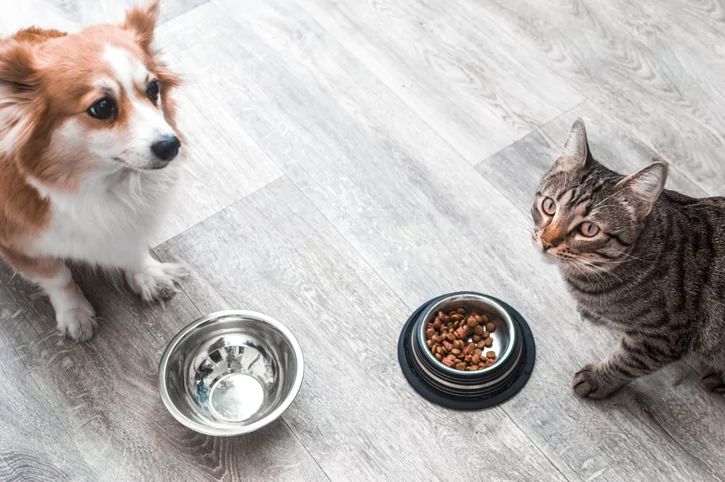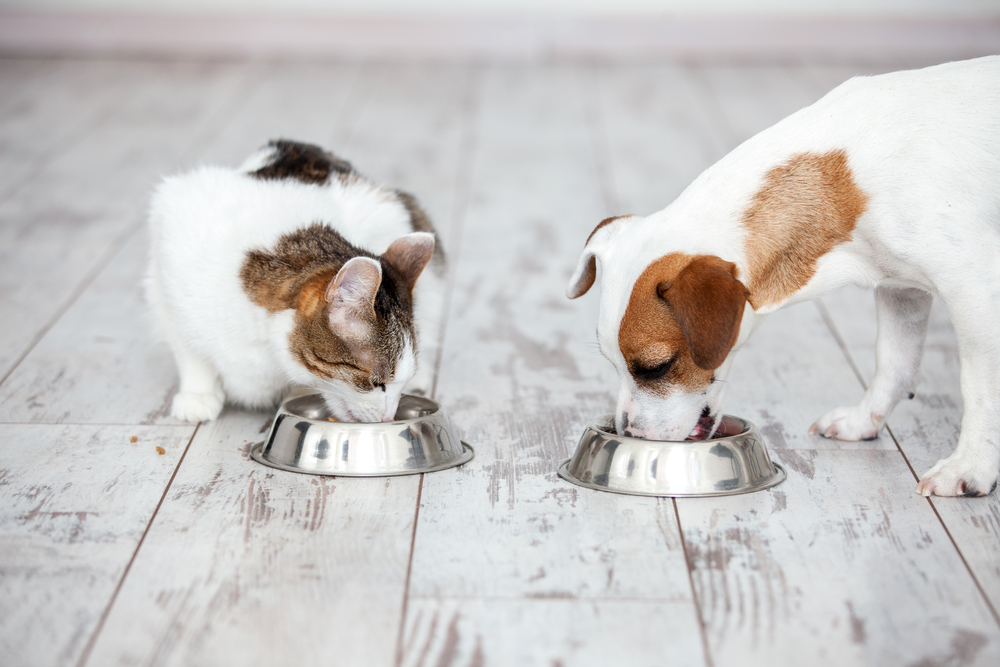You love your furry friends and want the best for them, but sometimes they have their own ideas about what’s best—like when your dog sneaks a bite of the cat’s food. You might wonder, is it bad for dogs to eat cat food?
This question nags at the back of your mind as you watch your dog chow down with enthusiasm. You want to make sure your pet stays healthy and happy, but you might not know all the facts. We will explore what happens when dogs eat cat food and why it’s not just a harmless snack.
We’ll reveal the surprising reasons why you should keep those bowls separate and share insights you can use to keep your pets safe and content. By the end, you’ll have a clear understanding and peace of mind, knowing how to make the best choices for your beloved companions. Ready to dive in and discover the truth? Let’s get started!
Nutritional Differences
Dogs and cats have different dietary needs. Cat food often contains ingredients that cater specifically to feline requirements. Dogs eating cat food may not get the right nutrients. This can lead to health issues. Understanding these differences helps ensure your pet’s well-being.
Protein Content Variations
Cat food usually has higher protein levels. Cats are obligate carnivores. They need more protein in their diet. Dogs are omnivores. They require balanced nutrition with protein, fats, and carbohydrates. Too much protein from cat food can strain a dog’s liver and kidneys.
Fat Levels In Cat Food
Cat food is rich in fats. This suits cats who need more fat for energy. Dogs need less fat compared to cats. Excessive fat intake can lead to obesity in dogs. It can also cause pancreatitis, a serious health condition.
Fiber And Carbohydrate Disparities
Dogs need more fiber in their diet. Fiber helps with digestion and bowel health. Cat food is often low in fiber. It may not meet a dog’s digestive needs. Carbohydrates provide energy for dogs. Cat food may not offer enough carbs, affecting a dog’s energy levels.

Credit: www.usatoday.com
Potential Health Risks
Feeding your dog cat food might seem harmless at first glance, but it can pose significant health risks. Dogs have different nutritional needs compared to cats, and regularly consuming cat food can lead to a variety of health issues. Understanding these risks can help you make better choices for your furry friend’s diet.
Digestive Issues
Have you ever noticed your dog with an upset stomach after sneaking some cat food? Cat food is richer in proteins and fats, which can be tough on a dog’s digestive system. Your dog might experience diarrhea or vomiting, leaving them uncomfortable and you worried. These digestive issues can disrupt your dog’s daily routine and cause stress for both you and your pet.
Obesity Concerns
Cat food tends to be more calorie-dense than dog food. If your dog eats it regularly, they might pack on extra pounds. Obesity in dogs is linked to numerous health problems like joint issues and diabetes. Keeping an eye on your dog’s weight is crucial, especially if they’ve developed a taste for cat food. Have you ever had to put your dog on a diet after indulging in forbidden snacks? It’s challenging but necessary for their health.
Kidney And Liver Problems
Excessive protein and fat intake can strain a dog’s kidneys and liver over time. Cat food is designed to meet the nutritional needs of cats, not dogs. These organs can become overworked, potentially leading to serious health issues. If you notice your dog drinking more water than usual or acting lethargic, it might be time to reassess their diet.
Choosing the right food for your dog is more than just following packaging labels; it’s about understanding the unique needs of your pet. Have you considered what you’re feeding your dog lately? Keep their health in check by providing a balanced diet, and remember, cat food isn’t part of that equation.
Behavioral Impacts
Feeding your dog cat food might seem harmless. But it can affect their behavior. Dogs and cats have different dietary needs. This difference in diet can lead to changes in behavior. Understanding these impacts helps you make better feeding choices for your dog.
Feeding Habits
Dogs eating cat food may develop unusual feeding habits. Cat food often tastes richer. Dogs might prefer it over their usual meals. This can lead to them refusing their regular dog food. They might beg more during meal times. Or even try to sneak into the cat’s bowl. Such habits can disrupt a dog’s normal eating routine.
Aggression And Food Guarding
Sharing food can lead to aggression. Dogs might become possessive of cat food. This can cause them to guard the food aggressively. It can also create tension between pets. Aggression is not just limited to other pets. Dogs may show aggression towards humans too. This could happen if they feel their food is threatened.

Credit: bottletreeanimalhospital.com
Long-term Consequences
Feeding dogs cat food may seem harmless at first. But, there are serious long-term consequences. Dogs and cats have different nutritional needs. Consistently eating cat food can harm a dog’s health. This section explores the long-term effects on your furry friend.
Nutrient Deficiencies
Dog food contains nutrients essential for canine health. Cat food lacks some of these key elements. Dogs need more carbohydrates than cats. Cat food is high in protein but low in carbs. This imbalance can cause energy deficiencies in dogs. Over time, dogs may become lethargic.
Cat food also lacks certain vitamins. Dogs need vitamins like B1 and D. Without these, dogs can face health issues. Their bones might weaken. Their skin can become unhealthy. A dog’s immune system may also suffer.
Chronic Health Conditions
Consuming cat food regularly can lead to chronic conditions. Dogs can develop kidney issues from high protein levels. Cat food is rich in fat, which risks obesity in dogs. Obesity can lead to heart disease and diabetes.
Digestive problems are another concern. Cat food is not easy for dogs to digest. This can cause stomach upset and vomiting. Long-term digestive issues can affect nutrient absorption. Dogs may struggle to maintain a healthy weight.
Pancreatitis is a severe condition linked to fat-rich cat food. It causes inflammation of the pancreas. This can be painful and lead to complications. Immediate veterinary care may be necessary.
Preventive Measures
Cat food is irresistible to some dogs. It smells good and tastes delicious. Yet, it is not ideal for a dog’s health. Taking preventive measures can help avoid health issues. These measures ensure your dog eats only what is safe and healthy.
Feeding Protocols
Create a strict feeding schedule for your dog. Feed your dog in a separate room. This avoids access to cat food. Keep cat food in a place out of reach. Store it on high shelves or closed cabinets. Provide meals at regular intervals. This keeps your dog satisfied and less likely to seek cat food. Use feeding bowls that are easy for your dog to eat from. This encourages them to eat their own food.
Monitoring Diet
Watch your dog’s eating habits closely. Notice any changes in their weight. This can indicate they are sneaking cat food. Observe their energy levels and behavior. A sudden change could mean they are not eating right. Regular vet check-ups can help track their health. Discuss dietary needs with your vet. Ensure your dog gets balanced nutrition. This reduces the temptation to eat cat food. Use surveillance if necessary. Cameras can help monitor when you are not home.
:strip_icc()/GettyImages-1137504605-4ea3ceec185f4d1e9dc39fb71f8ae04c.jpg)
Credit: www.fireline.com
Alternative Solutions
Dogs eating cat food isn’t ideal. They need different nutrients. Cat food is high in protein and fat. This can upset a dog’s stomach. Consider dog-friendly alternatives to ensure balanced nutrition.
Feeding your dog cat food might seem convenient, especially if your furry friends share living space. Yet, it’s essential to consider healthier alternatives that cater to your dog’s nutritional needs. Cat food isn’t just a different flavor—it’s a different nutritional composition, often high in protein and fat, which may not suit your dog’s dietary requirements. To ensure your dog gets the right nutrients, explore alternatives that are both beneficial and enjoyable for them.Dog-specific Diets
Dog-specific diets are crafted to meet the unique nutritional needs of canines. These diets are balanced with the right blend of proteins, fats, and carbohydrates. Next time you’re at the pet store, take a closer look at the dog food labels. Notice how they differ from cat food in terms of ingredients and nutritional content. By choosing a diet specifically for dogs, you ensure they receive the right nutrients for their age, size, and activity level. Have you noticed how your dog behaves after a meal? A balanced diet can lead to improved energy levels and overall well-being.Homemade Meals
Have you ever considered preparing homemade meals for your dog? Crafting meals at home allows you to control the quality and variety of ingredients. This can be especially beneficial if your dog has allergies or specific health needs. Imagine cooking a simple chicken and rice dish with some vegetables. Not only does this provide a balanced meal, but it also allows you to monitor what goes into your dog’s diet. However, ensure you consult with a vet or a pet nutritionist before making homemade meals a permanent solution. They can guide you on the necessary vitamins and minerals your dog requires. Creating a diet plan for your dog doesn’t have to be complicated. With a little research and guidance, you can make meal times healthier and more enjoyable for your furry friend.Frequently Asked Questions
What Happens If A Dog Eats Cat Food?
Dogs eating cat food occasionally is usually safe. Frequent consumption may lead to digestive issues or obesity. Cat food lacks nutrients vital for dogs and contains excess proteins and fats. Consult a vet if your dog shows signs of discomfort or illness after eating cat food.
Is It Okay To Feed Cat Food To My Dog?
Feeding cat food to dogs occasionally is okay but not recommended regularly. Cat food lacks essential nutrients dogs need. Dogs require a balanced diet specifically formulated for them. Regularly feeding cat food may lead to nutritional deficiencies and health issues in dogs.
Always consult a veterinarian for dietary advice.
What Should I Do If My Dog Only Wants To Eat Cat Food?
Gradually mix dog food with cat food to transition your pet. Offer dog food first before cat food. Consult a vet if needed for dietary advice. Ensure your dog gets balanced nutrition suitable for its species.
Can Dogs Eat Cat Food Safely?
Dogs can occasionally eat cat food without harm. However, regularly consuming it may lead to nutritional imbalances. Cat food contains higher protein levels designed for feline metabolism, which can cause digestive issues and weight gain in dogs. Always prioritize dog-specific food to meet your pet’s dietary needs.
Conclusion
Feeding cat food to dogs isn’t ideal. Dogs need specific nutrients. Cat food lacks these nutrients. It can cause health issues. Obesity, digestive problems, and nutrient deficiencies. So, stick to dog food. It’s formulated for their needs. Occasionally, cats and dogs can share treats.
But not regular meals. Always consult a vet if unsure. Proper diet keeps dogs healthy. It ensures their well-being and happiness. Choose suitable food for your furry friend. Keep their tails wagging with good nutrition.
